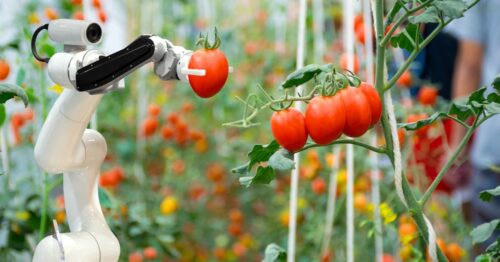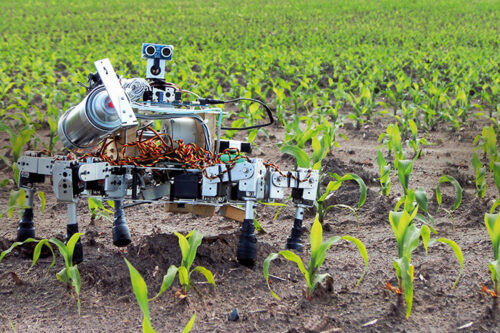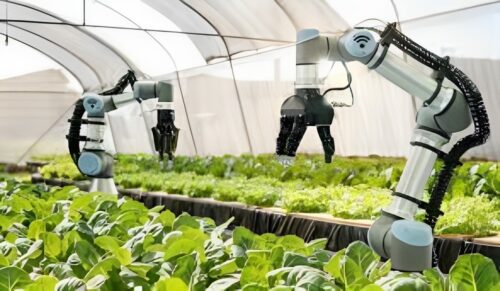
In Egypt’s Nile Delta, a quiet transformation is underway. Where farm workers once labored under the hot sun, sleek, autonomous robots now navigate between rows of strawberry plants, meticulously spraying pesticides with precision.
This technological leap is the brainchild of AgriCan, an agritech startup founded by Salem Ghanam, which is redefining how pesticides are applied in Egypt’s agricultural sector.
AgriCan’s journey began in 2020, but its origins trace back to a personal experience that left a lasting impression on Ghanam. In 2015, he was hospitalized in rural Egypt, where he met numerous farmers suffering from respiratory ailments caused by prolonged pesticide exposure.
This experience motivated him to develop an AI-powered solution to address the uncontrolled use of chemical pesticides, which are known to pose severe health risks.
Starting as a university project, AgriCan evolved into a full-fledged startup focused on leveraging robotics and smart technologies to optimize pesticide use and enhance crop monitoring. Initially experimenting with drones, the company pivoted in 2022 to developing ground-based robots equipped with AI and Internet of Things (IoT) capabilities.
These advanced machines use cameras and data analytics to detect plant diseases and administer targeted pesticide applications, reducing chemical waste and environmental impact. Despite its promise, AgriCan faces significant hurdles in driving technological adoption among Egypt’s farmers.
According to UN agricultural sustainability expert Mohammed Ali Faheem, smallholder farmers dominate the country’s agricultural sector and often lack the financial resources or technical literacy to embrace modern innovations. Furthermore, weak digital infrastructure, limited internet access in rural areas, and inadequate investment in agritech hinder the widespread adoption of smart farming solutions. “Convincing farmers to trust robotic technology remains a challenge,” he admited.
To address this, AgriCan initially offered free trials, allowing farmers to witness firsthand the improvements in crop quality and efficiency. Over time, word spread, and adoption grew. Today, the company collaborates with research centers in Egypt to develop training programs aimed at familiarizing farmers with emerging agricultural technologies.
Precision agriculture, which integrates AI, sensors, and automation, offers a sustainable path forward for Egypt’s farming sector. Faheem highlights the potential of smart agricultural tools such as robotic sprayers and greenhouse monitoring systems in enhancing sustainability. These technologies minimize chemical overuse, reduce crop disease, and lower environmental pollution, ultimately promoting food security and reducing health risks.

While robotic solutions present a promising future, cost remains a concern for smallholder farmers. “The high price of agricultural robots could be a major barrier,” Faheem warns, noting that any malfunctions in AI systems could lead to significant crop losses if not promptly addressed. Ghanam acknowledges these challenges but views climate variability as an even greater obstacle. “Adapting robotic solutions to sudden climate shifts within the same growing season is one of our toughest challenges,” he explains.
Despite these concerns, early trials suggest that AgriCan’s technology is delivering tangible benefits. In a field study comparing human-operated and robot-assisted farming, the robotic system achieved a 15% increase in yield, a 31% reduction in pesticide use, and a 12% decrease in labor costs. Farmers like Abdel Rahman Abdel Karim, who implemented AgriCan’s robotic sprayers on his farm, reported improved crop quality and a larger exportable yield.
AgriCan has already deployed its technology across 5,230 acres in Egypt and expanded its reach to the UAE and Jordan. By 2025, the company aims to launch Egypt’s first agricultural robotics factory. By 2027, Ghanam envisions AgriCan operating across more than 500,000 acres, pioneering a movement that integrates AI and automation into mainstream agriculture.
Beyond robotic sprayers, AgriCan continues to innovate. The startup has introduced greenhouse pesticide spraying systems, portable plant disease detection devices, and smart monitoring tools that track soil moisture, salinity, and greenhouse gas levels. In response to rising automation concerns, Ghanam emphasizes that such advancements are not replacing human labor but addressing the region’s shrinking agricultural workforce.
The World Bank has emphasized the role of agricultural automation in combating poverty, enhancing food security, and stopping climate change effects. AgriCan’s impact has gained recognition on a global scale, with the company representing Egypt at COP28 in Dubai after winning the National Initiative for Smart Green Projects competition. It is also set to showcase its innovations at COP29 in Azerbaijan, following a strong performance at the Africa Grows Green Award.
“We’re now working on securing patents in both Egypt and Europe for our precision spraying mechanisms,” Ghanam shares. “The goal is to optimize pest control through a revolutionary spraying system.”
As AgriCan scales its operations, its efforts symbolize a shift toward a more tech-driven and sustainable agricultural ecosystem. The startup’s success highlights the potential of AI and robotics in addressing key agricultural challenges while fostering economic growth and job creation.
With continuous advancements in smart farming, AgriCan is positioning itself at the forefront of a transformative era in Egyptian agriculture—one where innovation meets sustainability to drive long-term progress.



